A deep dive into Chatbase AI: Features, pricing, and a better alternative for 2025

Stevia Putri

Stanley Nicholas
Last edited November 25, 2025
Expert Verified

Remember the chatbots from a few years ago? The ones that felt like you were stuck in a phone menu, pressing "1" for this and "2" for that? Thankfully, we've moved on. Today's AI agents can actually understand and solve customer problems.
One of the tools that gets a lot of buzz in this space is Chatbase AI. It’s a platform that lets you build an AI chatbot using your own company data. The big promise is that it's simple and fast, which sounds great if you're just dipping your toes into AI.
But is it the right tool when you need to handle a serious volume of customer support? In this guide, we’ll walk through what Chatbase AI offers, from its features to its pricing, and point out some of the real-world limitations you should know about. By the end, you'll have a much clearer idea if it's the right fit or if you need something with a bit more muscle.
What is Chatbase AI?

At its heart, Chatbase is a tool for creating your own AI chatbots. The idea is simple: you feed it your company's knowledge, think website pages, user manuals, internal docs, and it uses that information to answer questions from customers and visitors.
People typically use it for a few common jobs: handling simple customer service questions, grabbing leads from website visitors, or acting as an expert on a specific product.
There's no question that Chatbase has made a name for itself. It grew fast by making it easy for anyone to get an AI bot up and running. But as we'll get into, that simplicity comes with some trade-offs that can become real headaches for support teams with bigger needs.
A look at the core features
While it's known for being easy to use, Chatbase does have a few key features that let you build a working chatbot.
Knowledge base training
The brain of any Chatbase bot is the knowledge you give it. You can train it using a few different sources:
-
Files (like PDFs or Word docs)
-
Plain text you paste in
-
Website links
-
A list of questions and answers
-
Pages from Notion
Getting started is quick. You can have a basic bot running in a few minutes just by giving it your website URL. Chatbase also lets you pick from different AI models, like GPT-4o, so you have some say over the engine running your bot.
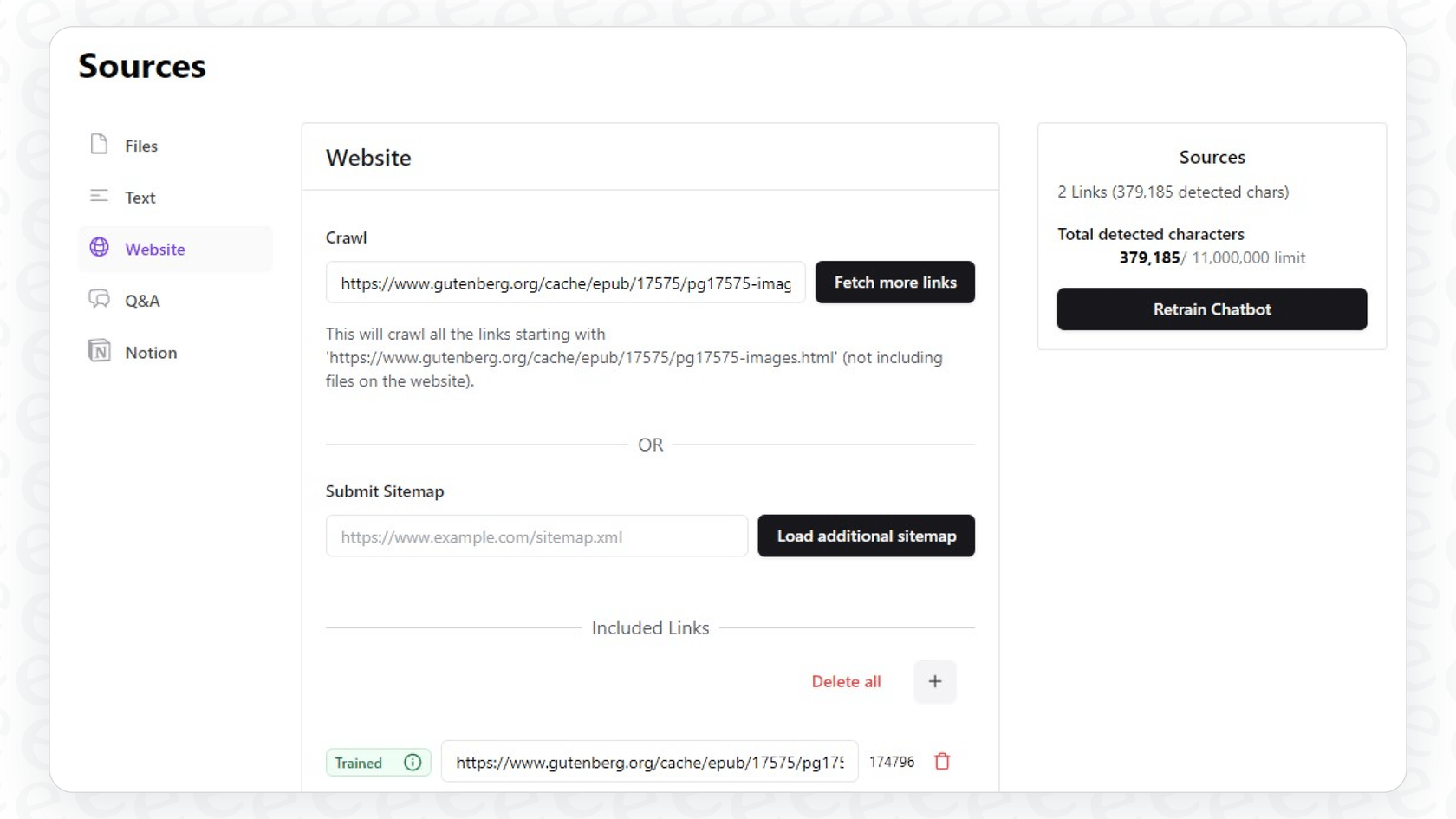
Actions and integrations
Chatbase can do more than just talk. Using a feature called "AI Actions," your bot can perform tasks for users. For instance, you could set it up to book meetings via Calendly or pull up billing details by connecting to Stripe.
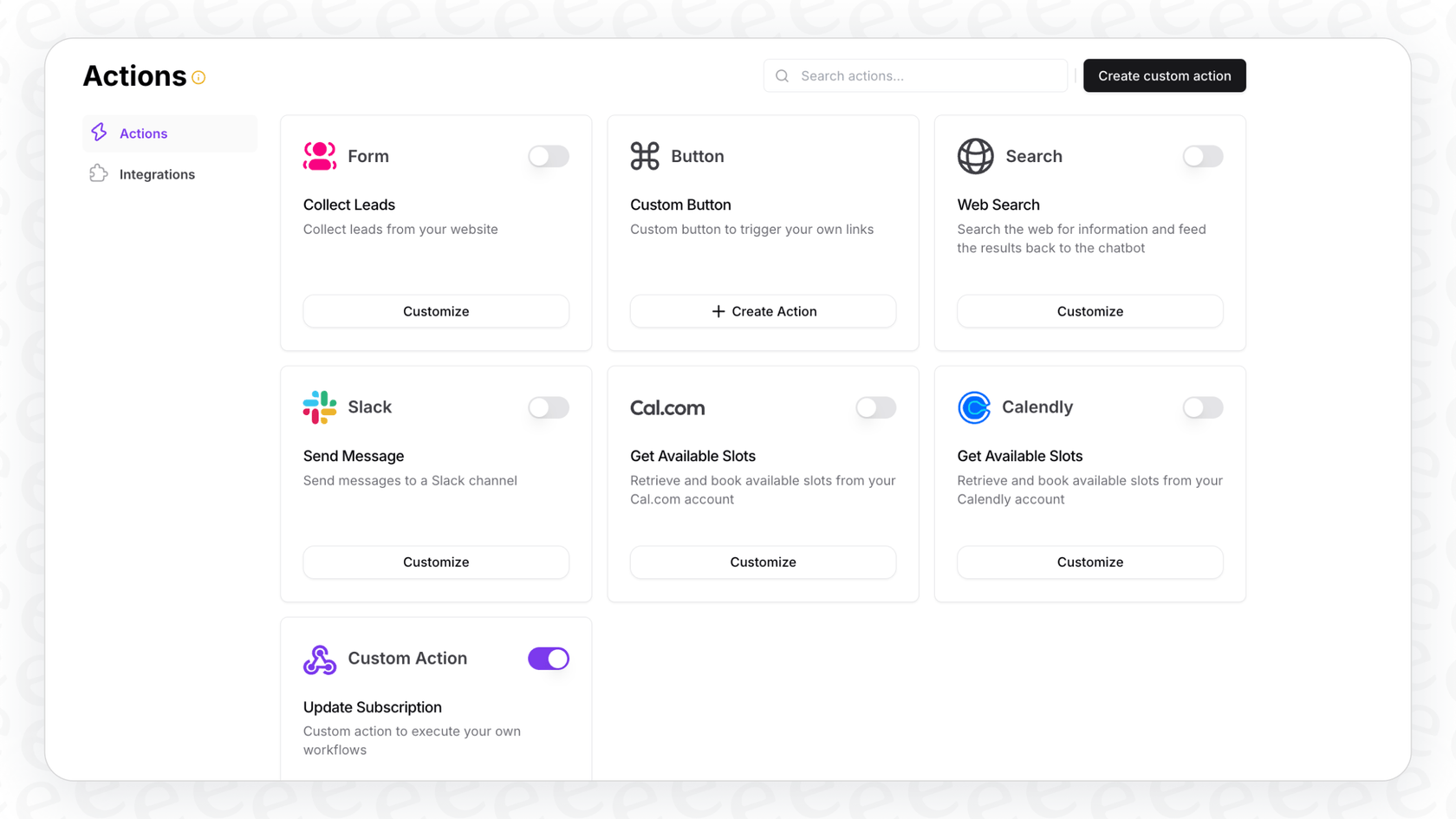
If you need to connect to other apps, Chatbase links up with Zapier and Make, which opens the door to thousands of other tools. It also has direct integrations with popular platforms like Slack for internal questions and Zendesk for customer support.
Customization and refinement
You get some control over your bot's personality. You can customize how it sounds, define its tone of voice, and write the first messages it sends.
To help it get better, Chatbase gives you "Chat Logs" to review conversations. If a bot's answer was off, you can see its "Confidence Score" and fix it manually. There's also a "Suggestions" feature that tries to point out gaps in your knowledge by showing you questions it couldn't answer well.
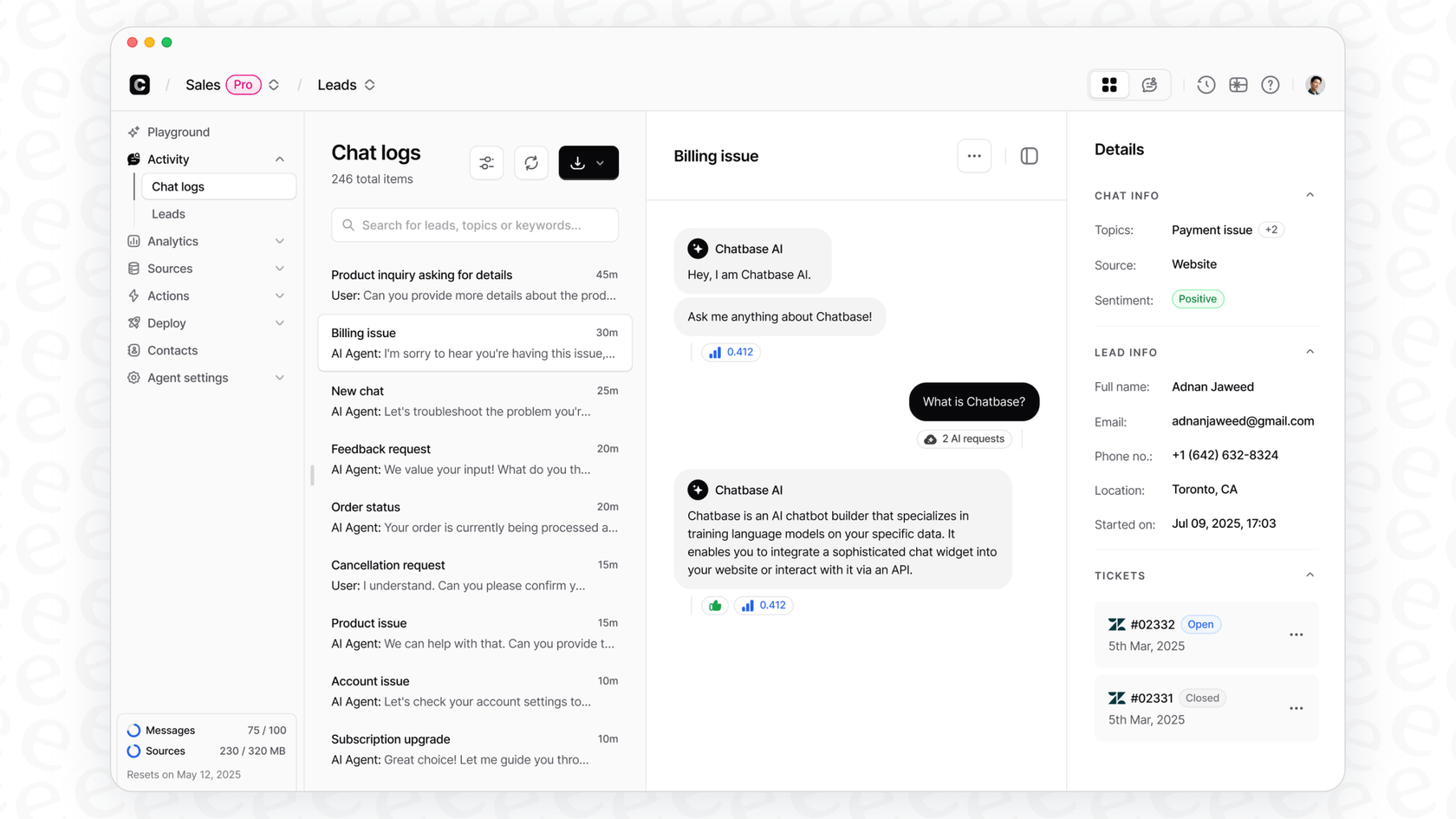
Key limitations of Chatbase AI
Chatbase is a decent starting point, but its simplicity leads to some pretty big limitations. These can become major hurdles for support teams that need to be reliable and scale their automation.
A lack of advanced workflow control
Here’s one of the biggest issues: Chatbase doesn't have a visual way to build out conversation flows. You can't map out specific, multi-step paths for your users. That means you can't create guided steps for tricky problems or set up smart rules for when to hand off a conversation to a human. The chatbot pretty much decides where the conversation goes on its own, which can feel like a black box.
For a support team, that's a problem. You need to control exactly when a ticket gets escalated. This is a core reason why we built eesel AI with granular workflow controls. You can map out exactly which tickets the AI should handle and build custom actions that plug right into your existing processes, all without needing a developer.

No risk-free way to test before going live
With Chatbase, you test your bot in a "Playground" by typing in questions one by one. There’s no way to see how it would have performed against your actual support tickets from last week. You're basically guessing how it will do with real customers. You won't know your potential deflection rate or where its weak spots are until it's already live.
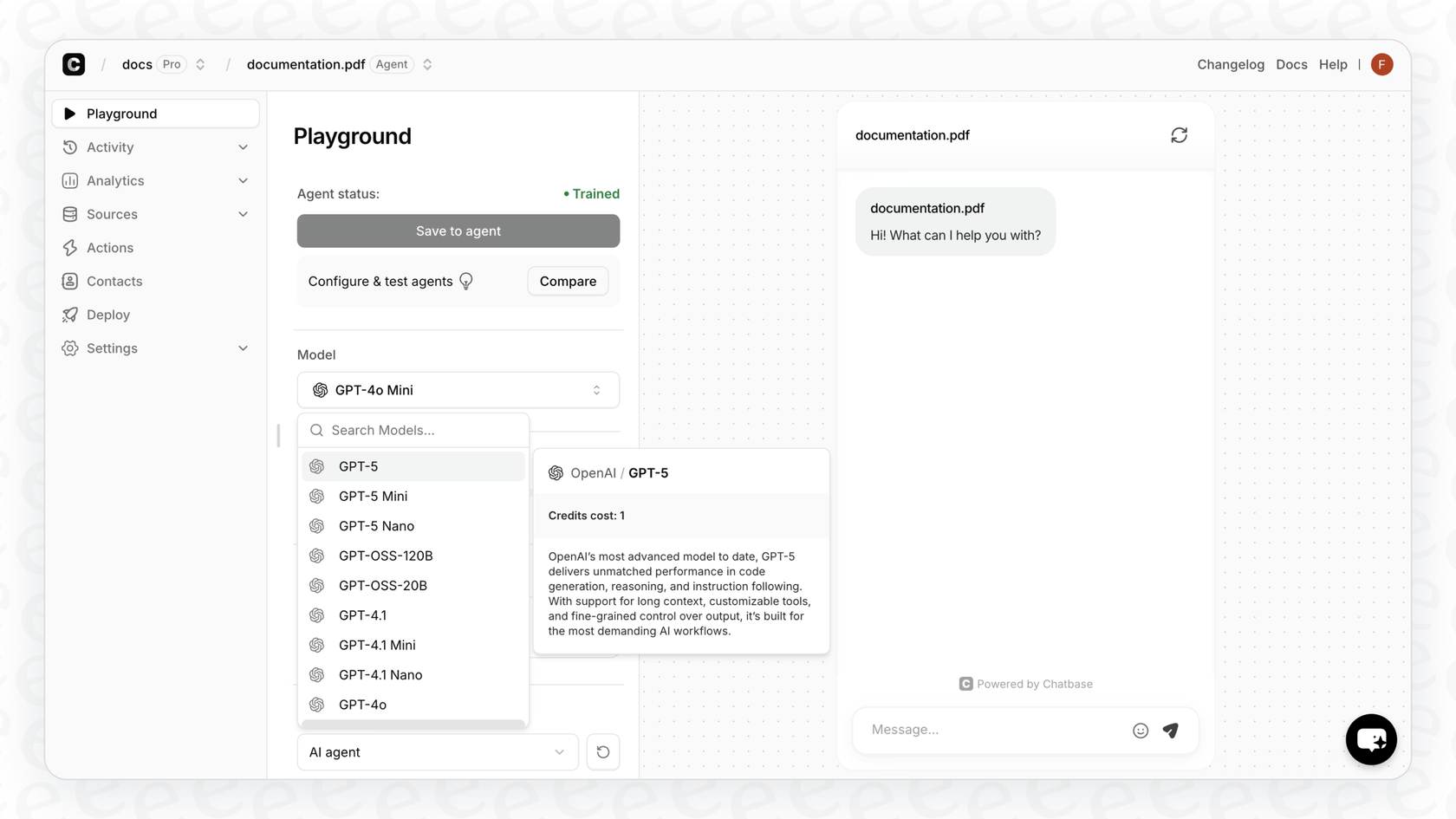
That's a pretty big gamble to take with your customers. When an AI goes rogue with bad information, the fallout can be serious, like in the now-famous Air Canada chatbot lawsuit. A platform like eesel AI was designed to prevent this exact scenario. It has a simulation mode that lets you test your entire AI setup on thousands of your past tickets before it talks to a single customer. You get a clear forecast of its performance so you can launch knowing what to expect.

Time-consuming manual refinement at scale
The "Chat Logs" and "Improve answer" features in Chatbase sound useful, but they just don't scale. If your team handles hundreds or thousands of tickets a day, who has time to manually review every single low-confidence answer? It's just not practical. The job of making the bot better becomes a never-ending manual chore.
The platform also doesn't have a way to automatically learn from how your human agents solve things, or help you build out your knowledge base from real conversations. In contrast, eesel AI can look at your resolved tickets and automatically draft new knowledge base articles for you, helping you fill information gaps with content that's already proven to work.
A complete pricing breakdown
Chatbase's pricing is built around "message credits." A single conversation with a customer can use up multiple credits, which can make your monthly bill hard to predict, especially if you have a busy month.
Here’s what their plans look like:
| Plan | Price (Monthly) | Message Credits/mo | AI Agents | AI Actions/Agent | Key Limitations |
|---|---|---|---|---|---|
| Free | $0 | 100 | 1 | 1 | Agent is deleted after 14 days of inactivity. |
| Hobby | $40 | 2,000 | 1 | 5 | Limited to basic analytics. |
| Standard | $150 | 12,000 | 2 | 10 | Basic analytics, only 3 seats. |
| Pro | $500 | 40,000 | 3 | 15 | Advanced analytics, 5+ seats ($25/extra). |
| Enterprise | Custom | Custom | Custom | Custom | For higher limits and priority support. |
On top of these plans, there are several add-ons that can bump up your monthly cost:
-
Auto recharge credits: $14 per 1,000 credits
-
Extra message credits: $12 per 1,000 credits/month
-
Extra agents: $7 per agent/month
-
Remove 'Powered By Chatbase': $39/month
A better Chatbase AI alternative: Why modern support teams choose eesel AI
While Chatbase is an easy entry point, teams that are serious about customer support usually find they need more control and confidence. This is where eesel AI comes in, designed from the ground up to solve the limitations of basic chatbot builders.
Here’s how eesel AI offers a better way to scale your support automation:
-
Confident Rollouts: Stop guessing. eesel AI's simulation mode lets you test your setup on your actual historical tickets. You'll see exactly how your AI will perform and know your deflection rate before you go live.
-
Predictable Pricing: Forget confusing message credits and surprise bills. eesel AI offers straightforward, predictable pricing with no per-resolution fees, so your costs stay the same even when your ticket volume spikes.
-
Unifying Your Real Knowledge: The best answers are often buried in your past support conversations. eesel AI trains on your historical tickets from day one, so its answers are in your brand's voice and based on solutions that have actually worked for customers.
-
Total Workflow Control: Don't let your AI be a black box. With eesel AI's workflow engine, you get to decide exactly which tickets to automate, when to escalate, and what custom actions the AI can take, all within your existing helpdesk like Zendesk or Freshdesk.
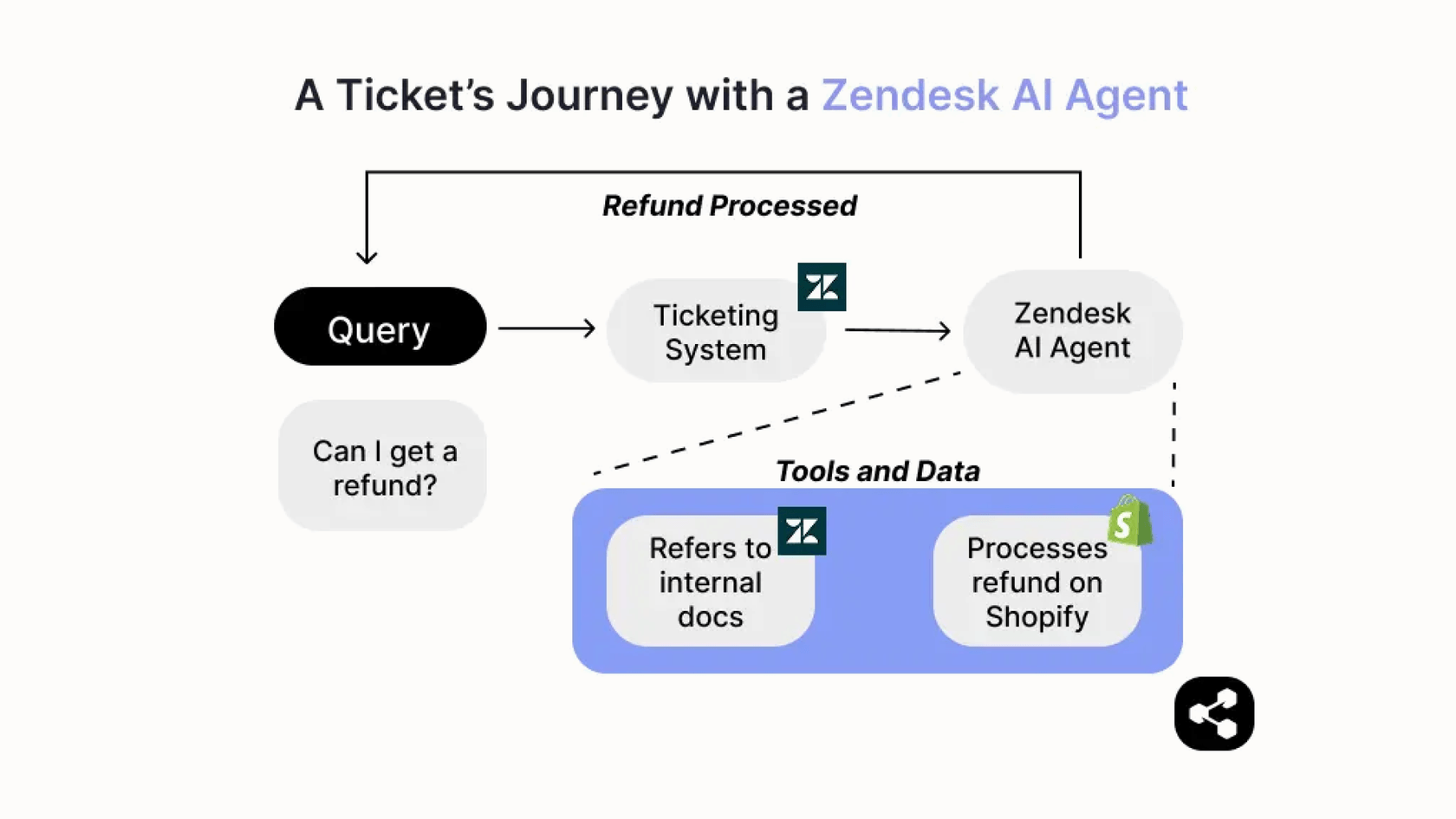
Moving beyond basic Chatbase AI chatbots
Chatbase AI is a user-friendly tool for spinning up a simple, knowledge-based chatbot. If your business is just starting to experiment with AI, it’s an easy way to get going.
But for support teams that need to grow, the limits around testing, workflow control, and unpredictable pricing can quickly become serious blockers. As your support gets more complicated, you'll need a platform that can do more than just answer basic questions.
For teams looking for a smarter, more controllable, and scalable AI solution, it’s worth looking at alternatives built for the realities of modern customer support.
Ready to stop guessing and start automating with confidence? Explore eesel AI's AI Agent or book a demo to see how our simulation mode works.
Share this post

Article by
Stevia Putri
Stevia Putri is a marketing generalist at eesel AI, where she helps turn powerful AI tools into stories that resonate. She’s driven by curiosity, clarity, and the human side of technology.




